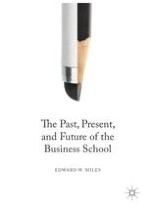2016 | OriginalPaper | Buchkapitel
6. Critical Juncture II: Mass Education and the Demise of the Humboldtian University: The Great Paradox—University in Ruin Caused by Its Own Success
verfasst von : Edward W. Miles
Erschienen in: The Past, Present, and Future of the Business School
Aktivieren Sie unsere intelligente Suche, um passende Fachinhalte oder Patente zu finden.
Wählen Sie Textabschnitte aus um mit Künstlicher Intelligenz passenden Patente zu finden. powered by
Markieren Sie Textabschnitte, um KI-gestützt weitere passende Inhalte zu finden. powered by
